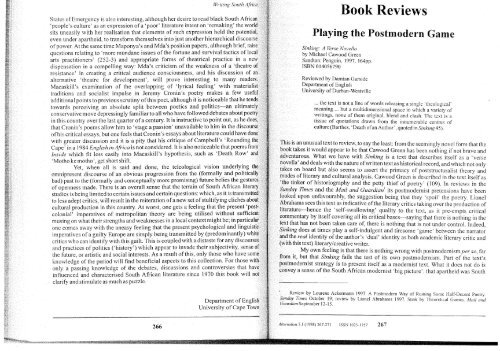Shane Moran - Alternation Journal
Shane Moran - Alternation Journal
Shane Moran - Alternation Journal
Create successful ePaper yourself
Turn your PDF publications into a flip-book with our unique Google optimized e-Paper software.
Book Reviews<br />
States of Eniergency is also interesting, although her desire to read black South Afric<br />
'people's culture' as an expression of a 'poor' literature intent on 'remaking' the<br />
sits uneasily with her realisation that elements of such expression held the pot<br />
even under apartheid, to transform themselves into just another hierarchical disco<br />
Playing the Postmodern Game<br />
of power. At the same time Maponya's and Mda's positio~l papers, although brief, r<br />
questions relating to 'more mundane issues of the fortune and survival tactics of 10<br />
arts practitioners' (252-3) and appropriate forms of theatrical PI-actice in a n<br />
dispensation in a compelling way: Mda's criticism of the weakness of a 'theatre<br />
king: A T/erse Novella<br />
Michael Ca~vood Green<br />
andton: Penguin, 1997, 164pp.<br />
ISBN 014056790<br />
resistance' in creating a critical audience consciousness, and his discussion of<br />
alternative 'theatre for development', will prove interesting to many rea<br />
Macaskill's examination of the overlapping of 'lyrical feeling' with mater<br />
traditions and socialist impulse in Jeremy Cronin's poetry inakes a few us<br />
eviewed by Damian Garside<br />
epartment of English<br />
niversity of Durban-Westville<br />
additional points to previousLscrutiny of this poet, althouih it is noticeable that he te<br />
towards perceiving an absolute split between poetics and politics-an ulti<br />
conservative move depressingly familiar to all who have followed debates about<br />
in this country over the last quarter of a century. It is instructive to point out, as he<br />
that Cronin's poems allow hiin to 'stage a passion' unavailable to him in the discou<br />
of his critical essavs. but one feels that Cronin's essays about literature could have d<br />
... the text is not a line of words releasing a single 'theological'<br />
meaning ... but a ~nultidi~nensional space in which a variety of<br />
writings, none of them original, blend and clash. The text is a<br />
tissue of quotations drawn from the innulnerable centyes of<br />
culture (Barthes. 'Death of an Author', quoted in Sinking45).<br />
with greater discussion and it is a pity that his c~iti'~ue of Campbell's 'Rouiidi~i<br />
Cape' in a 1984 English in Africa is not considered. It is also noticeable that poems<br />
Inside which fit less easily into Macaskill's hypothesis, such as 'Death Row<br />
'Motho ke no tho', get short shift.<br />
Yet, wken all is said and done, the teleological vision underlyi~lg<br />
omnipresent discourse of an obvious progression from the (for~nally and politic<br />
bad) past to the (formally and conceptually more promising) future belies the gest<br />
of openlless made. There is an overall sense that the terrain of South African 1<br />
studies is being limited to certain issues and certain questions: wliich, as it is trans<br />
to less adept critics, will result in the reiteration of a new set of stultifying cliches a<br />
cuit~~ral production in this count~y. At worst, one gets a feeling that the present '<br />
colonial' imperatives of inetropolita~i theory are being utilised without suffi<br />
musing on what their strengths and weaknesses in a local context might be; in ~arti<br />
one comes away with the uneasy feeling that the present psychological and lingu<br />
imperatives of a guilty Europe are simply being transmitted by (predominant1<br />
critics who can identify with this guilt. This is coupled with a distaste for any di<br />
and practices of politics ('history') which appear to invade their subjectivity, sen<br />
the future, or artistic and social interests. As a result of this, only those who have s<br />
kllowledge of the period will find beneficial aspects to this collection. For those<br />
only a passing knowledge of .the debates, discussions and controversies that<br />
influenced and characterised South African literature since 1970 this book wil<br />
clar~fy andstnnulate as much as puzzle<br />
text to review, to say the least: from the seemingly llovel for~n that the<br />
Id appear to be that Cawood Green has been nothing if not brave and<br />
at we have with Sinking is a text that describes itself as a 'verse<br />
anddeals with the nature ofwritten text as historical record, and which not only<br />
board but also seems to assert the primacy of poststructuralist theory artd<br />
aiy and cultural analysis. Cawood Green is described in the text itself as<br />
historiography and the petty thief of poetry' (109). In reviews in the<br />
mes and the Mail and Gzravd~un' its postmodernist preteilsions have been<br />
on unfavourably, the suggestion being that they 'spoil' the poetry. Lionel<br />
sees this text as indicative of the literary critics taking over the production of<br />
-hence the 'self-swallowing' quality to the text, as it pre-empts critical<br />
tary by itself covering all its critical bases-saying that there is nothing in the<br />
has not been taken care of, there is nothing that is not under control. Indeed,<br />
does at times play a self-indulgent and tiresome 'game' between the tlarrator<br />
real identity of the author's 'dual' identity as both academic literary critic and<br />
his text) literarylcreative writer.<br />
My own feeling is that there is nothing wrong with postinodemismper se, far<br />
but that Sinking fails the test of its own postmodernism. Part of the text's<br />
ernist strategy is to present itself as a modernist text. What it does not do is<br />
a sense of the South African modernist 'big picture': that apartheid was South<br />
ew by Lourens Ackerinann 1097 A Postmociern Way of Ru~ning<br />
5ome Ilalf-De~ent Poetry<br />
nzes October 19, revfew by Lionel Abraham7 1997 \unk by Theoletlcal Games Moil and
















